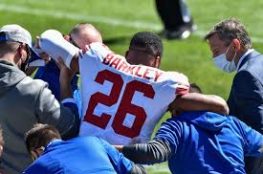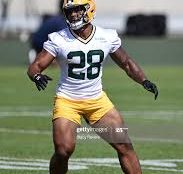Moishe: “Good morning, Andrew ‘Angry Olive’ Parr. Thank you for joining me today! Let’s start at the beginning: How did you get into fantasy football or fantasy sports in general?”
Andrew: “I’ve been playing fantasy football and fantasy baseball for thirty-five years. I started my junior year of high school, and I started by playing fantasy baseball. I actually started with what I would consider to be the purist form, which is rotisserie league baseball, which was started by a group of college professors among other people. There was a book published on how to play it, and I bought the book and devoured it. My favorite form of competition for fantasy baseball has always been the original rotisserie league style. And I enjoyed it so much that I thought that we ought to be able to do this with football, too. With the same group of players, we started a fantasy football league, and I’m pretty sure that Jimmy Zorn was the first starting quarterback on my first team.”
Moishe: “What drives you now? Why do you love it so much?”
“But the reason that I played for thirty-five years is that it’s so hard to walk away from. It’s challenging, it’s competitive, and I’ve always played in leagues where I’ve personally known and been friends with everybody or where I’ve known one-third of the league. I’ve always done it as a way to stay connected with friends.”
Moishe: “When we talk about dynasty leagues or keeper leagues, when you think about the NFL for instance with all the trading of draft picks, when you hear guys like Ted Thompson saying that the draft is the lifeblood of a team, I understand that you have a different philosophy.”
Andrew: “My point of view is that, even though a dynasty or keeper league is built to have a foundational element year after year, I have found that the reality is that you want to win every year. So, for me, the value of draft picks is acquiring enough that you can trade them away because the rest of the owners in the league value those draft picks more than I do.”
Moishe: “So you’re saying that you bring a sort of win-now mentality to every season that you plan even in a dynasty league?”
Andrew: “That’s correct. (A) who doesn’t want to win every year? And (B) it’s much easier to judge the current value of a player and to get far more reliable information about the upcoming season without having to forecast three or five years down the road. So, if you build your team in that manner, you’re willing to sacrifice what they might do in the future for what you are far more certain they can do this season.”
Moishe: “It’s the cliche ‘bird-in-hand’. You know what a player’s baseline — a player’s floor and ceiling are — for this year. And, even if you could draft a player next year with a higher ceiling, it’s an entire unknown. And the bird-in-hand is what’s going to keep you competitive every year. Is that what you’re saying?”
Andrew: “Absolutely.”
Moishe: “Now, let’s say that you’re going into 2019 and the veterans that you traded for last year hit their wall. Or one pulled a Calvin Johnson. Or one gets injured in April or May. And you look at your roster and think, ‘I don’t have a chance to win this year. And I’ve traded away a lot of my draft picks already as part of my philosophy.’ What do you do then?”
Andrew: “I would work to parlay the players that I have and whatever value that is remaining into draft picks or dollars and go and get the best that I can. That way, if I had a hint of getting into the playoffs, then I could support that in the off-season. I believe that, the way that fantasy football has played out, you have to play to get into the playoffs. You’ll get some teams that are far stronger and far more likely to move farther. But, in a traditional three-week playoff system, anything can happen. I just want to get into the playoffs, because, once you’re in, you can win.”
Moishe: “So you look at draft picks as a commodity to buy and sell? You look at draft picks to turn around and trade for something more later? You’re not looking at draft picks as a way to build your team?”
Andrew: “Right. [I would put it this way:] I am looking at them as a way to build my team, but not as a way to acquire players through the draft. I’m looking at using them as a way to acquire players to put on my team for this season.”
Moishe: “And, if you know that you’re going to be out of for this year, then you’ll trade the guys that you don’t think will help you in 2020 for draft picks, and then in 2020 you’ll use those picks to help you get players for that season?”
Andrew: “Exactly.”
Moishe: “Let’s jump back to the playoffs here. There are some teams that will happily tank one or two seasons to stack the deck to try to win in one or two seasons. Their idea is that they don’t want to finish in 3rd, 4th, 5th, or 6th place — they want to finish first. And they’ll take a couple of losing seasons to put them in better position to do it. That does not seem to be your approach.”
Andrew: “Absolutely not. While pride is a great driving factor — and there is nothing to be more proud of than a championship — I’m more than happy to finish 2nd, 3rd, or 4th to pay for the league that year. If I paid for myself to pay for the next season, then I consider it a successful season even if I don’t win a championship and even if that championship would pay my league’s entry fees for the next three years.”
Moishe: “So you’re happy basically playing every year for free on someone else’s dime until that one year when everything works or lighting in the bottle happens or your sixth-place team that sneaks into the playoffs goes on a run.”
Andrew: “Absolutely. We saw that this past season in GMFFL [General Manager Fantasy Football League, which Moishe envisioned and of which Moishe is the commissioner] where my co-owner Dave and I owned what was widely believed to be the team to beat in the playoffs. And we lost in our first game. Nonetheless, we still earned enough money [by scoring the most points in the regular season] to pay for us to play the next year.
“I’ve found over time — and I have played both ways — prior to five years ago, when I really came to this revelation, I’ve found that trying to stack the deck for two to three years down the road has never really worked out the way I wanted it to. You get enamored with young players who have their initial fantastic season or you become enamored with players in a rookie draft. At the end of the day, it has been for me about stacking the deck with veteran players whom you can more reliably predict a single season’s performance for. And your bench is essentially supplementing your bye-week players throughout the course of the season.”
Moishe: “You mentioned that you play in some leagues you can only keep a limited amount of players in a keeper league. How does that change or support your philosophy?”
Andrew: “It’s actually easier to operate under my philosophy in that system because there are more players available. In a dynasty league, you have to work a lot harder to bring win-now talents to your team. Whereas in a keeper league, where roster size is restricted, it’s a lot easier to acquire those win-now players because there are more players available.”
Moishe: “Let’s turn to auction leagues and/or salary cap leagues. You no longer have draft picks to buy and sell. How do you apply your philosophy to a salary cap league?”
Andrew: “It still applies, but you’re making your trades in order to acquire more dollars. I’ll potentially take a loss on talent to get the dollars that I need. I believe that I’ll use those dollars to acquire better talent than what I’m giving up.”
Moishe: “So you’re looking at the dollars as the trade commodity, as the draft pick commodity. You’re looking at those dollars as the way to go after veterans instead of rookies.”
Andrew: “Exactly. And I’m not talking about going after the Pierre Garcons of the world. Even though you have a pretty good idea of what they’re going to produce, what they’re going to produce isn’t what you need. I’m talking about going after someone with a three- to four-year solid draft record of performance, not somebody in maybe their eighth or tenth year of service time in the NFL.”
Moishe: “Would it be fair to say that you do not tend to chase upside or ceiling?”
Andrew: “Yes.”
Moishe: “You’re more looking to guarantee a high floor?”
Andrew: “Correct.”
Moishe: “When you look at a dynasty league, a lot of people say that their goal is to build a dynasty. They want to be the Golden State Warriors. And they’re willing to bottom out for a couple of years to get it. You’re more of the San Antonio Spurs. The team that is always going to be good enough to be competitive. They’re good enough to win any single series — but they might not often be the favorite. But they’ll always give themselves a real chance.”
Andrew: “Absolutely. That’s my goal. To me, building a dynasty is not about building a team that is going to win back-to-back-to-back championships. To me, building a dynasty is about building a team that is going to finish in the money every year knowing that at some point along the line — take a five-year run — if I’m in the money every year for five years, there’s a likelihood that at least one of those years I’m going to win the whole thing.”
Moishe: “Are you averse to rookies? Do you ever have rookies on your team?”
Andrew: “I’m not averse to rookies, and I do have rookies on my team. To me, the rookie is more of a player who is plug-and-play for me. If he really breaks out, then great. And that might be the year that I’ll win it all. But, in any given year, I’m not counting on a rookie. I’m hoping for a moderate performance. I acquire those players with the intent to trade them in the course of the season for higher-value players who are going to contribute this season. There are plenty of teams out there willing to build their dynasty banking on what might happen in the future versus what I believe is going to happen this season.”
Moishe: “So let’s take Alvin Kamara for a moment. And maybe he’s the exception to the rule. But, after a rookie has two, three, four weeks of monster performances, are you looking to trade him away?”
Andrew: “I am. And maybe that would be a very bad decision. Two years later, looking back, it sure looks like it would have been. My point of view is that this is someone who is far out-performing his original perceived value, and typically people who are out-performing their value for a short period don’t continue to do that. So, yes, I would definitely be interested in upgrading to a proven veteran by trading away the high-value in-the-moment [rookie] player.”
Moishe: “Do you apply that philosophy to veterans, too? Let’s say that you have a veteran who has consistently been a top-25 wide receiver and then finishes a season at top-8. And he’s only 28, 29 years old, so he’s not over-the-hill. Do you look to move him right away?”
Andrew: “Not unless I feel like I’m going to get another veteran back who is going to even jump that level of performance. Again, I am looking to play for this year. So, if I have a veteran with a proven track record, and he starts to out-pace his track record, then I am going to more strongly believe that this is a reality that is going to continue for the balance of the season rather than an outlier because he has already been really, really good for three years. Maybe it’s because of a new offensive lineman, or quarterback, or coach, and there’s no reason to believe that he’s not going to do it the rest of the season.
“And, if he doesn’t do it the following season, then maybe I keep him because it’s beneficial to keep him on my roster or maybe at that point I move him to acquire a greater number of draft dollars for the auction [or for picks for the future].
“One of my [other] philosophies in salary leagues where players are able to receive raises is I stopped giving players raises. Why would I give a player a raise and contract extension for next season when I don’t care about next season until next season is ready for me to care about it?”
Moishe: “So you have a player that you believe is out-performing the value of his contract. And, even if you were to give him a raise, he would still be out-performing the value of his contract. Still, you would not give him a raise and an extension because it would hinder your chances this year?”
Andrew: “That’s correct. I don’t want to spend the money this year to give the raise because I could use that money to acquire other talent. I still have that player on my roster for this season, and he’s still going to perform or out-perform the value. So, why handicap my budget by paying him more to do the work that he’s already going to do?”
Moishe: “In professional sports, you have to have chemistry, team-building, locker room. You have to learn to run plays together. There’s heightened value in trying to keep a team together. In fantasy sports, you have no loyalty to your players. They’re simply commodities.”
Andrew: “That is 100% correct. My view, even in a dynasty league, is that the core group of players on my team — there is a revolving door in my proverbial locker room. And players are just in and out based on what they can do for me in the current season.”
Moishe: “Would you ever buy a player who was put on injured reserve whom you think is going to explode next year — maybe you’re higher on him than others — if that means that you have to stash him on your team for next year?”
Andrew: “If, because he’s on the injured list, he comes at a significant discount and it’s not going to impact my overall [chances of winning this year], then I would definitely do that. And you have to remember that one of the reasons that I would do that is because that player then becomes a trade chip. If other players in the league believe that he’s going to be a value for them next year and they’re not playing for this year, then I could trade that player for someone who will help me this season. Even if it’s someone that I could put on my bench to use during my bye weeks.
“What I’m playing on is that I can get so much more value for this year because other teams believe that they’re getting so much more value for future years. I want to prey on everyone’s mentality of building [their] team for long-term [while I] would build a team to win this year. My mentality would never be to tank a season.”
Moishe: “Looking at 2019, who are some players that you would be looking to acquire by trade?”
Andrew: “Let’s take quarterbacks out of the equation because they seem to have a longer shelf life in both the NFL and fantasy football. So, I’m looking to acquire any running backs, wide receivers, or tight ends in their 3rd-5th year with a three-year track record of high-level performance.”
Moishe: “So, guys like A.J. Green, Julian Edelman, Delanie Walker, Adrian Peterson — they’re veterans who can often be acquired for cheap and still be productive this year: you’re not particularly interested in them?”
Andrew: “It depends on how the rest of my team is built. [Even] A.J. Green is, by the definition I just gave, outside the realm of the people that I would typically target. It also seems as though for three or four of the last five seasons, he has been unavailable during his fantasy teams’ playoffs. So, if my philosophy is to try to win the whole thing and he’s out for the fantasy playoffs, then I don’t want him. Now, if I could get him for a reasonable value and know that I could trade him to someone who values him higher than I do, then I would acquire him, take the ride for the early part of the season where he would contribute, then absolutely have it on my calendar to trade him at the trade deadline and get somebody whom I am more confident will be healthy and playing during the playoffs.”
Moishe: “I’m having trouble identifying guys that you would you target. You’re either thinking of guys who have already ascended — guys like OBJ, Michael Thomas — or guys that you buy because they have a reasonable floor — guys like Tyler Boyd, Kenny Golladay, or Sterling Shepard. But, these are guys but guys that other owners want because of their ceiling. So, who are guys that you are going to target that are sort of productive enough year-in and year-out but that don’t have that ceiling that’s going to give you a lot of competition to get them?”
Andrew: “That’s an interesting question because I will actually buy those players [that you mentioned]. I understand that other owners in the league are also interested in those players. I have no aversion to paying current market value for a player. I’m not going into the draft or the auction trying to get someone in, say, the sixth round who has a third-round value or to get someone for $5 who has a higher value. I’m always willing to pay fair-market value.”
Moishe: “Now let’s say that you have the same opportunity to acquire for the same cost either Amari Cooper or Brandin Cooks. Cooks has been about as consistent as they come: around 85 catches or so — 1,100 yards, 6-8 touchdowns every year — but has not yet shown the capacity to have a 100-catch, 1,300-yard, 12-touchdown season. Amari Cooper has shown the capacity to have a 50- or 60-catch season with 900 yards and 3 touchdowns but I think that he has that upside of having that 100-catch, 1,300-yard, 12-touchdown season. You’ll take Brandin Cooks just about every time presuming that their cost is the same?”
Andrew: “Absolutely.”
Moishe: “Then this brings another question to mind. Last year, toward the end of the season in my dynasty league, I traded away two first-round picks and two second-round picks for Tyreek Hill. Obviously, that was last year before news about Tyreek Hill came out. Would you have made that trade, or would you have rather looked to trade each of the firsts and seconds for single players who might make valuable contributions? In other words, how do you feel about that kind of all-eggs-in-one-basket opportunity?”
Andrew: “I love that question. You have to look at your team for each season, and you have to look at what’s available on the market. So, I would absolutely make that trade that you made; there’s no two ways about it. That makes a significant impact on what my team is going to do and how it’s going to perform this season. But, I don’t make that trade without doing my due diligence to talk to other owners and see what’s available. If Tyreek Hill in one fell swoop is the best that I can get for those draft picks and is going to make the impact that I want, then I absolutely make that deal. If I feel that I can get two separate players in two separate deals that might not be as high an impact as Hill is individually but combined is better for my roster as constructed than just Hill on his own, then I make two separate deals.”
Moishe: “Switching gears, Ted Thompson and Bill Belicheck are in some ways identical — and here me out here! — in that both are stubborn, stubborn, stubborn as to their approach. They have very different approaches to building a team, but they are stubborn. They will never change no matter what. Even if every other team in the league adopts their approach, they’re just going to think that they can do it better than anyone else. Now take it back to a fantasy league. People could read this transcript and think, ‘My God, Andrew is right all along. We’re idiots.’ Everyone then starts doing what you’re doing. Are you going to now believe that you can do it better, or are their times when you’re going to do that proverbial zag when everyone is zigging?”
Andrew: “No. I’m going to stick with it and believe that I’m going to do it better than anyone else. Part of that is because it’s just the way that I’m built, and part of that is because I have across a number leagues seen teams try to copycat and not be able to pull it off.”
Moishe: “Andrew, anything else that you would like to add? Any questions that you think I missed?”
Andrew: “No, I think you hit the nail on the head. In terms of reiterating: building your dynasty is building your team to try to finish in the money in consecutive seasons. Building to win [the championship] is just too hard and too unlikely. I have found a great deal of success building to win year after year after year rather than chasing the pot of gold at the end of the rainbow that might not actually be there.”
Moishe: “Andrew, thank you so, so much for your time and for your insight. I really appreciate it!”
Andrew: “Absolutely. Thanks for having me on the interview. It’s always fun to talk and share.”



